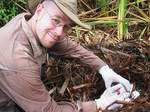Identifying species' ecological fates
A new ecological study led by a University of Adelaide researcher should help identify species prone to extinction under environmental change, and species that are likely to become a pest. The study, the first of its kind, has been published online in the British Ecological Society's prestigious Journal of Ecology. "This study provides good evidence that we can take any group of species and predict how individual species will respond to changes in the environment through events such as climate change or habitat loss," said lead author Associate Professor Corey Bradshaw, from the School of Earth and Environmental Sciences. The researchers analysed life-history and ecological traits in more than 8900 species of the legume, or Fabaceae, plant family and found a correlation between evolved species' traits and a particular susceptibility to a species becoming threatened or invasive. "The urgency and scale of the global biodiversity crisis means we need good generalised predictors of a species' likelihood of going extinct or becoming invasive in non-native areas," said Associate Professor Bradshaw. "Previous studies have been limited by studying one or other of these 'fates' in isolation. "Developing evidence-based rules of thumb for categorising poorly studied species according to their susceptibility will aid decision makers in choosing best ways to allocate finite conservation resources." Associate Professor Bradshaw, who is also employed by the South Australian Research and Development Institute (SARDI) as a senior scientist, said lists of 'species to watch' - both threatened and potentially invasive - should be expanded based on ranking of 'susceptibility traits'. "Our results are particularly valuable where there is sustained habitat loss or fragmentation, especially given the predictions that climate change will simultaneously promote the expansion of invasive alien species and greater extinction rates in others," he said. Story by Robyn Mills
|





